Randy Brown's Blog, page 2
April 1, 2024
Chapbook Brews ‘War Poems about Coffee’
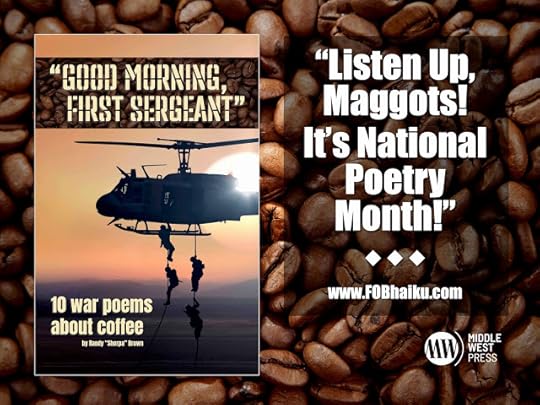
With a tip of the campaign hat to both April Fools’ Day and National Poetry Month, Middle West Press LLC has today launched a new digital chapbook featuring 10 humorous “war poems” about coffee.
The $3 sampler, available as a Kindle e-book, collects new and previously published poems by the award-winning citizen-soldier-poet Randy “Sherpa” Brown, as well as the classic drill-sergeant essay “Listen Up, Maggots! It's National Poetry Month!”
Find the digital chapbook at Amazon here at this link.
Randy “Sherpa” Brown embedded with his former Iowa Army National Guard unit—the 2nd Brigade Combat Team, 34th Infantry “Red Bull” Division—as a civilian journalist in Afghanistan, May-June 2011. He served in uniform for 20 years, with one overseas deployment in 2003. He subsequently authored the award-winning poetry collection “Welcome to FOB Haiku: War Poems from Inside the Wire.”
He is a former editor of community and metro newspapers, as well as national trade and consumer newsstand magazines, and is now a freelance writer, editor, and independent publisher. His essays, journalism, and poetry have appeared widely both on-line and in print.
His on-cover book credits include co-editing the anthologies “Why We Write: Craft Essays on Writing War” and “Things We Carry Still: Poems & Micro-Stories about Military Gear.” Brown is a three-time poetry finalist in the annual Col. Darron L. Wright Memorial Writing Awards, administered by the Chicago-based literary magazine Line of Advance.
Learn more about Randy Brown at: linktr.ee/randysherpabrown
Middle West Press LLC (www.middlewestpress.com) is a Johnston, Iowa-based editor and publisher of non-fiction, journalism, and poetry. As an independent micro-press, it publishes one to four titles annually. Its projects are often inspired by the people, places, and history of the American Midwest.
April 25, 2023
New War Poetry Anthology Inspired by Wilfred Owen’s ‘Spring Offensive’

CultureCult Press, a literary independent that publishes poetry, short fiction, and books related to horror, pop-culture, and film, has just published an anthology titled Spring Offensive: Poetry of Strife and Spring. The press is based in Kolkata, West Bengal, India.
The anthology project comprises the works of 39 poets from around the world, each inspired by British soldier Wilfred Owen’s poem “Spring Offensive,” which was written during World War I.
Reprinted in the book are citizen-soldier-poet Randy Brown’s poems “Three Tanka from Des Moines, Iowa – Spring 2016” and “fighting seasons.” The latter poem first appeared in Brown’s 2015 debut poetry collection, Welcome to FOB Haiku: War Poems from Inside the Wire.
The publisher writes:
From the blossoming of new life to the chaos and devastation of conflict, these poems are a powerful exploration of the human experience. This illustrated collection is a testament to the resilience of the human spirit, and a reminder that even amidst the most challenging of circumstances, hope can still bloom. Whether you are a poetry aficionado or a newcomer to the genre, “Spring Offensive” is a must-read for anyone looking to experience the transformative power of poetry.
In the United States, the 100-page anthology Spring Offensive can be purchased via Lulu.com as a $15.99 trade paperback or as a $3.99 e-book.
April 3, 2023
“Listen Up, Maggots! It’s National Poetry Month!”
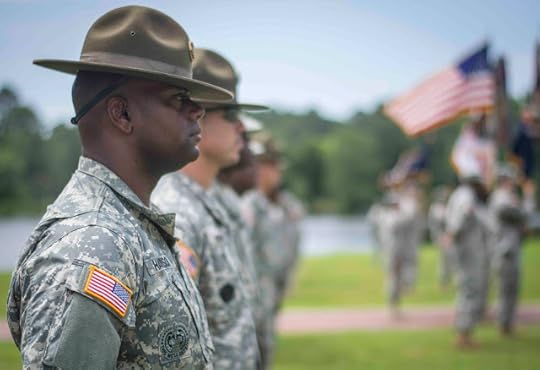 PHOTO BY: U.S. Army Sgt. Ken Scar
PHOTO BY: U.S. Army Sgt. Ken ScarThis post, written by the author of FOB Haiku: War Poems from Inside the Wire, originally appeared on the Red Bull Rising blog April 6, 2016. It also was featured in the 2019 Military Writers Guild anthology Why We Write: Craft Essays on Writing War .When packing for one of my first training experiences with the U.S. Army, back in the late 1980s, I knew that free time and footlocker space would be at a premium. I could live without luxuries like my Walkman cassette player for a few months. I also wanted to avoid too much gruff from drill sergeants. So I stuffed a paperback copy of Shakespeare's "Henry V" into my left cargo pocket, wrapped in a plastic sandwich bag, as my sole entertainment.
If nothing else, I thought, I'd work on my memorization skills. ("Oh, for a muse of fire-guard duty …") Little did I realize that so much of my brain would already be filled, starting those summer months at Fort Knox, Ky., with the nursery rhymes of Uncle Sam. Training was full of poetry. Sometimes, it was profane. "This is my rifle, this is my gun!" Sometimes, it was pedagogical. "I will turn the tourniquet / to stop the flow / of the bright red blood." There were even times that it was nearly pathological. "What is the spirit of the bayonet?! / Kill! Kill! Kill!"
These basic phrases connected us new recruits to the yellow footprints of those who had stood here before, marched in our boots, squared the same corners, weathered the same abuses. Every time we moved, we were serenaded by sergeants. Counting cadence, calling cadence, bemoaning that Jody was back home, dating our women, drinking our beer. We learned our lines, our ranks, our patches, our places as much by tribal story-telling than by reading the effing field manual. Even our soldier humor was hand-me-down wisdom, tossed off like singsong hand grenades. Phrases like, "Don't call me 'sir' / I work for a living!" and "You were bet-ter off when you left! / You're right!"
Nobody's quite sure why April got the nod as National Poetry Month. I like to think that it's because of that line from T.S. Eliot's "The Wasteland": "April is the cruelest month." Because that sounds like the Army. Besides, in springtime, the thoughts of every warrior-poet lightly turns to baseball; showers that bring flowers ("If it ain't raining / it ain't training!"); and the start of fighting season in Afghanistan.
Poetry, I recognize, isn't every soldier's three cups of tea. Ever since I entertained my platoon mates with Prince Harry's inspiring St. Crispin's Day speech, however, I've enjoyed sneaking poetry into the conversation. Perhaps more soldiers would appreciate poetry, were they to realize the inherent poetics of military life:
Every time you go to war, you are engaged in a battle for narrative. Every deployment—individually as a soldier, or collectively as an Army or nation—is a story. Every story has a beginning, middle, and end. Every story is subject to vision, and revision. History isn't always written by the victors, but it is re-written by poets. Treat them well. Otherwise, they will cut you.
Every time you eat soup with a knife, you are wielding a metaphor. Every "boots on the ground," every "line in the sand," every Hollywood-style named operation ("Desert Shield"! "Desert Storm"! "Enduring Freedom"!) is a metaphor that shapes our understanding of a war and its objectives. If you don't understand the dangerous end of a metaphor, you shouldn't be issued one.
(There's also a corollary, and a warning: As missions change, so do metaphors. In other words, when a politician trots out a new metaphor for war, better check your six.)
Every poem is a fragment of intelligence, a piece in the puzzle. A poem can slow down time, describe a moment in lush and flushed detail. It can transport the reader to a different time, a different battlefield. Most importantly, a poem can describe the experience of military life and death through someone else's eyes—a spouse, a villager, a soldier, a journalist. Poetry, in short, is a training opportunity for empathy.
Soldiers like to say that the enemy gets a vote, so it's worth noting that the enemy writes poetry, too. Like reading doctrine and monitoring propaganda, reading an enemy's verse reveals motivations and values. Sun Tzu writes:
If you know the enemy and know yourself, you need not fear the result of a hundred battles. If you know yourself but not the enemy, for every victory gained you will also suffer a defeat. If you know neither the enemy nor yourself, you will succumb in every battle.Every time you quote a master, from Sun Tzu to Schwarzkopf, you are delivering aphorism. I liken the aphorism—a quotable-quote or maxim—to be akin to concise forms of poetry, such as haiku. In fact, in my expansive view, I think aphorisms should count as poetry. In the world of word craft, it can take as much effort to hone an effective aphorism than it does to write a 1,000-word essay. Aphorisms are laser-guided missiles, rather than carpet bombs. We should all spend our words more wisely.
Reading a few lines connects us to the thin red line of soldiers past, present, and future. Poetry puts us in the boots of those who have served before, hooks our chutes to a larger history and experience of war. The likes of Shakespeare's "band of brothers" speech, John McRae's "In Flanders Fields," and Rudyard Kipling's poem "Tommy" continue to speak to the experiences and sentiments of modern soldiers.
I am happy to report that more-contemporary war poets have continued the march.
Here's a quick list to probe the front lines of modern war poetry: From World War II, seek out Henry Reed's "The Naming of Parts." For a jolt of Vietnam Era parody, read Alan Farrell's "The Blaming of Parts." From the Iraq War, Brian Turner's "Here, Bullet." In this tight shot group, modern soldiers will no doubt recognize themselves, their tools, and their times. Here is industrial-grade boredom, an assembly line of war, punctuated with humor and grit, gunpowder and lead.
Want more? Check out print and on-line literary offerings from Veterans Writing Project's "O-Dark-Thirty" quarterly literary journal; Military Experience & the Arts' twice-annual "As You Were"; the "Line of Advance" journal; and Southeast Missouri State University's "Proud to Be: Writing by American Warriors" annual anthology series.
Finally, you can buy an pocket anthology of poetry, such as the Everyman's Library Pocket Poets edition of "War Poems" from Knopf, or Ebury's "Heroes: 100 Poems from the New Generation of War Poets." Stuff it in your left cargo pocket. Read a page a day as a secular devotional, a meditation on war. Or, pick a favorite poem, print it out, and post it on the wall of your fighting position or office cube. Read the same poem, over and over again, during the course of a few weeks. See how it changes. See how it changes in you.
Remember: It's National Poetry Month. And every time you read a war poem, an angel gets its Airborne wings.
*****
Randy Brown embedded with his former Iowa Army National Guard unit as a civilian journalist in Afghanistan, May-June 2011. He authored the poetry collection Welcome to FOB Haiku: War Poems from Inside the Wire. Recently, he co-edited the Military Writers Guild anthology Why We Write: Craft Essays on Writing War. He is the current poetry editor of Military Experience and the Arts' "As You Were" literary journal, and a member of the Military Writers Guild. As "Charlie Sherpa," he blogs about citzien-soldier culture at www.redbullrising.com and military writing at www.aimingcircle.org.
February 8, 2023
New on Kindle: Soldier-Poet Targets Moral Puzzles through Lens of TV Show
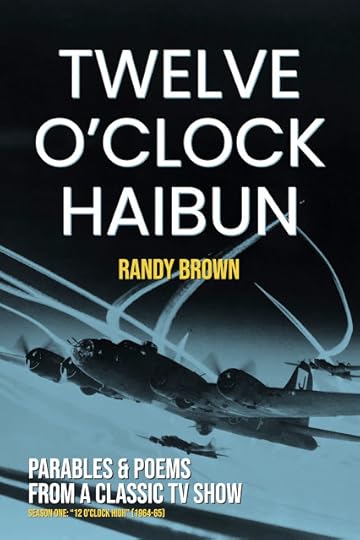
In the new Kindle e-chapbook Twelve O’Clock Haibun: Parables & Poems from a Classic TV Show , humor-loving soldier-poet (and former “Army lessons-learned analyst”) Randy Brown invites readers to view the 1964-1965 first season of the “12 O’Clock High” as a series of moral dilemmas and puzzles.
The TV series is now viewable FREE on Amazon Prime Video , as well as Internet platforms.In this standalone spin-off to the author’s ground-breaking 2022 lyrical meta-essay Twelve O’Clock Haiku: Leadership Lessons from Old War Movies & New Poems, readers can now match wits and wisdom with the charismatic and brooding Brig. Gen. Frank Savage (Robert Lansing), commander of the fictional 918th Bomb Group, as he and his heroic air crews stoically navigate tests of endurance, morality, courage, and loss.
A haibun is a Japanese form, comprised of a short prose narrative followed by a haiku. In haibun, the prose and poetry elements traditionally do not address each other directly, but they do relate thematically. Ideally, the impressions left after reading a haibun should be greater than the sum of its two parts.
The Twelve O’Clock Haibun project comprises brief, spoiler-free summaries of all 32 episodes of the TV show’s first season, plus one additional “final” episode in order to complete a narrative arc. For each, a prose section first describes an episode’s situational frame, without offering resolutions. A companion haiku then illuminates a moral question or dilemma suggested by the story. Readers are left to reflect on the implications of each situation. As in war, there are no easy answers.
In addition to other accolades, Brown is a three-time poetry finalist in the Col. Darron L. Wright Memorial Awards, administered annually by the Chicago-based literary journal Line of Advance. His 2015 collection, Welcome to FOB Haiku: War Poems from Inside the Wire, was awarded a gold medal distinction from the Military Writers Society of America. His chapbook So Frag & So Bold: Short Poems, Aphorisms & Other Wartime Fun was published in 2021.
He is the co-editor of two non-fiction books: Reporting for Duty: Citizen-Soldier Journalism from the Afghan Surge, 2010-2011, published in 2015; and Why We Write: Craft Essays on Writing War, published in 2019.
As “Charlie Sherpa,” he blogs about modern war poetry at www.fobhaiku.com, and about writing on military themes at www.aimingcircle.org.
TWELVE O’CLOCK HAIBUN: Parables & Poems from a Classic TV Show (Middle West Press LLC) is available as a $2.99 Kindle e-book edition exclusively via Amazon.
Middle West Press LLC is a Johnston, Iowa-based editor and publisher of non-fiction, journalism, and poetry. As an independent micro-press, we publish one to four titles annually. Our projects are often inspired by the people, places, and history of the American Midwest.
February 3, 2023
5 Haiku about Studio Ghibli's 'The Wind Rises'
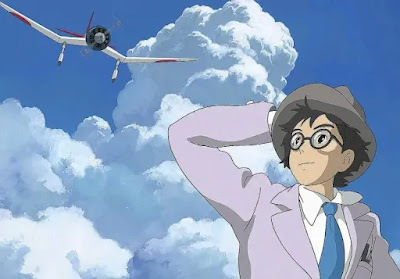
The author of "Twelve O'Clock Haiku: Leadership Lessons from Old War Movies & New Poems" and "Welcome to FOB Haiku" has published a new aviation-and-war-themed poem.
The haiku sequence is part of a “Ghibli Week” themed package at The Daily Drunk Magazine, an on-line literary journal that focuses on popular culture and film. Editors there recently called for less-than-500-word tributes to the work of Japanese creator Hayao Miyasaki's animation studio, Studio Ghibli.
Poet Randy Brown's "five haiku inspired by 'The Wind Rises'" regards a 2013 animated feature written and directed by Miyasaki, which explores themes of aviation, war, and the artistic struggle to create.
Studio Ghibli animated movies are celebrated for magical character designs and dream-like settings, as well as delivering clear-eyed, nuanced, and empathy-inducing narratives.
The stories Miyasaki has written himself notably also often feature examples of flying, whether through magic or machinery. Examples include a novice witch's broom in "Kiki's Delivery Service" (1983), and a pack of swashbucklers' seaplanes in "Porco Rosso" (1992). The studio's name itself, which translates as "hot desert wind," notably also derives from an airplane design used by the Italian military in World War II.
"The Wind Rises" tells a highly fictionalized biography of Japanese aircraft designer Jiro Horikoshi (1903-1982), and incorporates unrelated story elements of The Wind Has Risen, a 1936 novel by Tatsuo Hori (1904-1953). Horikoshi aspired to make beautiful airplanes; while Horikoshi thought war was a mistake, he helped produce such war machines as the celebrated A6M "Zero" fighter plane.
As Brown writes in one haiku:
our country pays us
to make beautiful warplanes;
embrace irony
Read the rest of Brown's haiku poems here at this link.
"When I was writing 'Twelve O'Clock Haiku'—my recent deep-dive into World War II aviation, ethics, and 'bomber' poetry— I first encountered the haiku of Santōka Taneda, who protested Japan's bombing of China in the late 1930s. I was also familiar with Horikoshi's life through Miyasaki's 'The Wind Rises,'" says Brown. "I hope my Ghibli-inspired haiku inspire people to watch the movie, and, if only for a moment, to engage with a hope for peace and resilience."
In addition to Brown's haiku, a sampling of the other “Ghibli Week” prose and poetry published by The Daily Drunk Magazine includes:
"Why I Wish Hayao Miyazaki Would Cook Me Dinner" by Darcy L. Wood"castle breakfast gone wrong and two haiku poems" by Abby Moeller"better a lost love than a forgotten sea plane" by Julia"Two Ghibli Poems" (including "In my dreams Jiro Horikoshi did not make fighter planes") by Gretchen"What Pom Poko Taught Me to Grieve" by Claire Noelle SimsRead all 23 items in the “Ghibli Week” package here at this link.You can follow The Daily Drunk Magazine on Twitter: @dailydrunkmag
Or on the World Wide Web: dailydrunkmag.com
September 18, 2022
Through Classic WW2 Movie, Humorist-Poet Explores Go-to-War Ethics
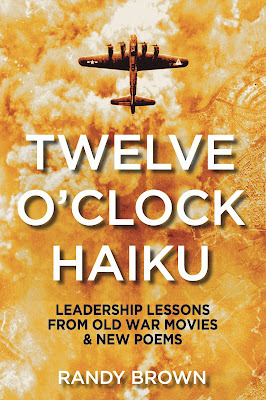
In a cheeky critique of the classic American air power narrative “Twelve O’Clock High,” award-winning soldier-poet, essayist, and humorist Randy Brown explores what it means to be a leader or follower at war—morally, physically, and psychologically. The book is packed full of insights into military life, as viewed through the lenses of war movies, history, and the author’s experiences as a one-time U.S. Army-trained “lessons-learned analyst.” “I started out to write 12 haiku poems about a favorite old war movie,” says the author, “but my ‘whimsical experiment in minimalist war poetry’ mutated into a ‘maximum effort’ mix of memory, media, and military culture!” TWELVE O’CLOCK HAIKU: Leadership Lessons from Old War Movies & New Poems now comprises poems both old and new, a lyric essay about the film, and a list of resources for enthusiasts of World War II bomber poetry, history, and movies. Brown first encountered the 1949 movie when on temporary duty as a U.S. Army citizen-soldier. Whether as a novel, film, or late-1960s television series, the “Twelve O’Clock High” franchise continues to be a touchstone in 21st century Professional Military Education (PME) and business-class discussions about transformative leadership, ethics, organizational learning, and management techniques. In addition to other accolades, Brown is a three-time poetry finalist in the Col. Darron L. Wright Memorial Awards, administered annually by the Chicago-based literary journal Line of Advance. His 2015 collection, Welcome to FOB Haiku: War Poems from Inside the Wire , was awarded a gold medal distinction from the Military Writers Society of America. His chapbook So Frag & So Bold: Short Poems, Aphorisms & Other Wartime Fun was published in 2021. He is the co-editor of two non-fiction books: Reporting for Duty: Citizen-Soldier Journalism from the Afghan Surge, 2010-2011 , published in 2015; and Why We Write: Craft Essays on Writing War, published in 2019. As “Charlie Sherpa,” he blogs about modern war poetry at www.fobhaiku.com, and about writing on military themes at www.aimingcircle.org. Starting September 18, 2022 (the 75th birthday of the U.S. Air Force !!!):
Middle West Press LLC is a Johnston, Iowa-based editor and publisher of non-fiction, journalism, and poetry. As an independent micro-press, we publish one to four titles annually. Our projects are often inspired by the people, places, and history of the American Midwest.
TWELVE O’CLOCK HAIKU: Leadership Lessons from Old War Movies & New Poems (116 pages, Middle West Press LLC) is available in a $14.99 trade paperback edition through Amazon and other booksellers, as well as a $9.99 Kindle e-book edition exclusively via Amazon.
November 3, 2021
New Poem: 'Dune' Worm as Sandwich-Maker
 The author of "Welcome to FOB Haiku" and "So Frag & So Bold" has published a poem written in the voice of the monstrous sandworms of Frank Herbert's 1966 science-fiction novel "Dune."
The author of "Welcome to FOB Haiku" and "So Frag & So Bold" has published a poem written in the voice of the monstrous sandworms of Frank Herbert's 1966 science-fiction novel "Dune."Poet Randy Brown's "The Quotable Shai-Hulud, Subway Sandwich Artist(tm), abridged" gives voice to the great worm as the sandwich-making employee of a national fast-food restaurant. The poem is presented as a series of maxims, most of which are based on lightly altered quotations from Herbert's original text.
For example, the poem begins:
"Bless the Sandwich-Maker and all His Ingredients. Bless the coming and going of Him, May His passing cleanse the world. May He keep the world for his people."
Herbert's epic space opera tells the story of political and military machinations around a singular desert planet called Arrakis, the universe's sole source of "Spice." Spice is a mineral that variously enables prophesy and intergalactic travel. Underground deposits of the cinnamon-like material often seem to be guarded by lumbering "sandworms," some of which can grow to be hundreds of meters in length.
Editors at The Daily Drunk Magazine, an on-line literary journal that often focuses on popular culture and film, had earlier solicited prose and poetry written to the prompt, "The sandworm from Dune takes a day job."
The novel "Dune" has recently been presented as a $165 million feature movie—the first of two parts—directed by Denis Villeneuve and starring Timothée Chalamet, Zendaya, and others. The Daily Drunk Magazine reviewed the new movie "Dune" here.
Portions of Herbert's "Dune" books have previously been made into a 1985 feature film directed by David Lynch, and two Sci-Fi Channel mini-series: "Frank Herbert's Dune" (2000) and "Frank Herbert's Children of Dune" (2003).
In addition to Brown's poem, other "Dune"-inspired prose and poetry published this week by The Daily Drunk Magazine included:
"Every Sandworm" by Jerod Beloff"Enemies to Lovers" by Manahil Bandukwala"There’s a lot riding on him, but that’s okay – at 450 metres long, you’ll hardly notice" by Mike Hickman"Uber Through the Sands of Arrakis" by Andre F. Peltier "Mind-Killer of the Golden Path" by Clem Flowers"may thy knife chip and shatter" by natalie hanna"New Job Blues for Shai-Hulud" by Ross CrawfordYou can follow The Daily Drunk Magazine on Twitter: @dailydrunkmagOr on the World Wide Web: dailydrunkmag.com

October 27, 2021
New 'War Poems' are Pithy, Pulpy and ... Fun?!
“Every poet,” warns journalist and poet Randy Brown, “has a heart filled / with shrapnel.”
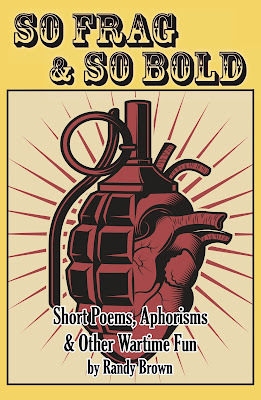 In his new chapbook
SO FRAG & SO BOLD
, the former U.S. Army “brigade staff jester” takes aim at endless wars, parent traps, social media, and stodgy religious beliefs. It’s an iconoclastic cluster-munition that’s bursting with more hundreds of haiku, aphorisms, philosophical puzzles, and other experiments in pithy and pulpy poetry.
In his new chapbook
SO FRAG & SO BOLD
, the former U.S. Army “brigade staff jester” takes aim at endless wars, parent traps, social media, and stodgy religious beliefs. It’s an iconoclastic cluster-munition that’s bursting with more hundreds of haiku, aphorisms, philosophical puzzles, and other experiments in pithy and pulpy poetry.Brown’s careful constructions of line-breaks and language are intended to variously provoke chuckles, empathy, and thought. “Any poem is a device,” he writes, “improvised to explode with meaning [...] ignited by a trigger / word.”
In addition to other accolades, Brown is a three-time poetry finalist in the Col. Darron L. Wright Memorial Awards, administered annually by the Chicago-based literary journal Line of Advance. His debut collection, Welcome to FOB Haiku: War Poems from Inside the Wire, was awarded a 2016 gold medal distinction from the Military Writers Society of America (MWSA).
In May-June 2011, Brown embedded as a civilian journalist with the Iowa Army National Guard’s 2nd Brigade Combat Team (B.C.T.), 34th Infantry “Red Bull” Division. He subsequently collated and helped publish Reporting for Duty: Citizen-Soldier Journalism from the Afghan Surge, 2010-2011, an unabridged 668-page chronicle of that deployment. (Click here for short promotional video of the book.)
His poetry and non-fiction have appeared widely in print and on-line. As “Charlie Sherpa,” he blogs about modern war poetry at www.fobhaiku.com, and about writing on military themes at www.aimingcircle.org.
Starting Nov. 1, 2021:
SO FRAG & SO BOLD: Short Poems, Aphorisms & Other Wartime Fun (84 pages, Middle West Press LLC) is available in a $9.99 trade paperback edition through Amazon and other booksellers, as well as a $2.99 Kindle e-book edition exclusively via Amazon.
Middle West Press LLC (www.middlewestpress.com) is a Johnston, Iowa-based editor and publisher of non-fiction, journalism, and poetry. As an independent micro-press, we publish one to four titles annually. Our projects are often inspired by the people, places, and history of the American Midwest.

September 11, 2021
New Poem Commemorates Sept. 11, 2001
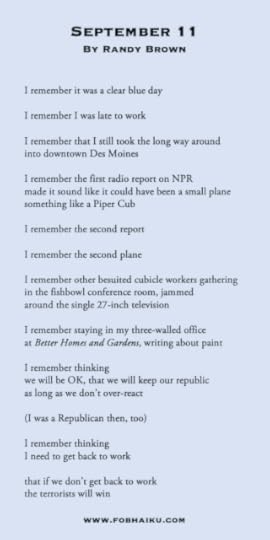
The author of "Welcome to FOB Haiku" has new work appearing at The Wrath-Bearing Tree poetry feed on Twitter, in a project commemorating the 20th anniversary of the terrorist attacks of September 11.
The Wrath-Bearing Tree is an on-line journal of culture and politics often written from the perspectives of military family, veterans, and service members. Poems there are also often inspired by news events and headlines.
"The poem interrogates my memories and beliefs of 20 years ago," says Randy Brown, "and is intended to implicate my past/present roles both in the production of words, and in the production of war."
"I am once-again indebted to Wrath-Bearing Tree poetry editor Amalie Flynn and her colleagues, for prompting and presenting my work," he says.
Check out WBT Poetry on Twitter here: @wrathbtpoetry
You can directly access the poem on Twitter here at this link.

July 8, 2021
'Pokémon Go' Haiku Now on NewVerseNews!

The author of "Welcome to FOB Haiku" has new poetry appearing in The New Verse News, a website that regularly presents "politically progressive poetry on current events and topical issues." Poems there are often inspired by recent news events and headlines.Randy Brown's new work, titled "a veteran Pokémon Go trainer leaving Bagram, Afghanistan writes haiku" is based on recent downrange reporting by J.P. Lawrence at the newspaper Stars and Stripes. "It is a set of five snarky haiku-like war poems involving a Pokémon video game," says Brown. "Like they say, 'Gotta read them all!'"
You can read Brown's new poetry here.
The original July 2, 2021 news story is titled, "Soldiers watch the US withdrawal from Bagram Airfield through the lens of Pokemon Go."
As reported by Lawrence and others, U.S. military personnel last week reportedly abandoned Bagram Airfield (BAF), Parwan Province, Afghanistan without much coordination, if any, with Afghan officials. At the height of the "Afghan Surge" in 2010-2011, as partly documented in the 2016 collection of U.S. Army journalism "Reporting for Duty," the sprawling installation once housed more than 30,000 U.S. and Coalition troops.
Lawrence reports that Pokémon Go , an "Augmented Reality" (A.R.) video game in which players capture and train fantastical cartoon monsters using smart-phone cameras. Unlike U.S. troops, some of those virtual pets apparently remain in place at Bagram—and will do so in digital perpetuity.
As a former U.S. National Guard citizen-soldier, Lawrence has a grunt's-eye view and knack for finding new and original stories. "I'm always impressed with how J.P. finds fresh ways to illuminate what is going on in Afghanistan and Iraq," says Brown. "He's written about military stakeboarders, Afghan policewomen who write poetry, and the 'Zombielands' created after American bases are abandoned. And now, video games as a lens and metaphor through which to view our involvements and effects there."
A former newspaper journalist, Brown encourages other military-adjacent poets engage in artistic reactions to current events. In addition to The New Verse News, Brown notes, news-driven poetry markets include:Rattle magazine's weekly "Poets Respond" featureThe Wrath-Bearing TreePoets Reading the News
*****
Photo caption: Oct. 28, 2016—Airman 1st Class Quintin Rice, 50th Force Support Squadron, shows off his badge case at Schriever Air Force Base, Colorado. Rice earned the title “Pokémon master” after he collected all eight badges during the 50th Space Wing’s Chaplain’s Office’s “Pokémon challenge.” Photo by U.S. Air Force 2nd Lt. Scarlett Trujillo




